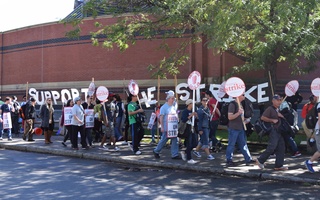{shortcode-1c34e027427b29d4de4f0c6d70c9dfbb5a1e4904}
We are glad to see that Harvard is committed to its service workers, per a recent article published in the New York Times. According to the article, service workers employed by a contractor working with the University receive equal benefits, including health insurance and vacations, to those they would receive if they were employed by the University directly. The result of this policy is that service workers at Harvard can earn enough to live comfortably, with many lifted into the middle-class. This pay rate lies in stark contrast to that of comparable service jobs outside the University, most of which pay less than $30,000 a year.
Harvard is setting a good example in its implementation of this policy. The University is hearing its employees’ concerns rather than outsourcing to less expensive options. This demonstrates loyalty to Harvard service employees and the acknowledgement that people deserve to be well-compensated for their work. Still, the wages and benefits Harvard offers may not scale to the economy at large without causing unemployment. They also might only be possible for well-endowed institutions. Nevertheless, Harvard’s implementation of this policy is commendable.
For other institutions considering this policy, it’s worth noting that, in 2001, the committee appointed to study the issue estimated that this policy would cost the University between $2.4 million to $3.7 million a year. This is a fairly insignificant amount compared to Harvard’s operating budget of almost $5 billion — the University improved the lives of its service workers without experiencing much financial loss for doing so.
Of course, these changes did not occur by themselves, and the organizations that engendered them, including the Harvard Living Wage Campaign and student protesters, too deserve our praise. Students protested outside of Massachusetts Hall — the location of the office of the University president. Dozens of the protesters also occupied the first floor as part of a three-week sit-in. This is a powerful reminder of the importance and effectiveness of protest in creating lasting change in Harvard’s administrative policies.
These are positive changes that the University is making, but the University should take bigger steps in helping its service workers. These steps should include (but should not be limited to) giving them the skills and resources that are necessary — including education — to get other jobs should they choose to leave Harvard in the future.
The University could not run without its employees of all levels, and Harvard’s pay and benefits for its service workers shows its recognition of this. We hope to see this continued devotion in the years to come.
This staff editorial solely represents the majority view of The Crimson Editorial Board. It is the product of discussions at regular Editorial Board meetings. In order to ensure the impartiality of our journalism, Crimson editors who choose to opine and vote at these meetings are not involved in the reporting of articles on similar topics.
Read more in Opinion
A Wrinkle in Harvard TimeRecommended Articles
-
Letter to the Editor: Creativity and the HUDS StrikeThat creativity and ingenuity have yet to show their face in the negotiations to end this dispute.
-
Students Talk Summer Service at Campus SymposiumThis summer, Keturah J. Gadson ’21 traded Cambridge brick for the open skies of Sunflower, Mississippi — a town with a population of just over 1,000 which she described as “frozen in time” — to help teach local students.
-
 Harvard Activists Hold Rally on Campus to Advocate for TPS Recipients, Prison Reform
Harvard Activists Hold Rally on Campus to Advocate for TPS Recipients, Prison Reform -
 Union Civil and Human Rights Committee Begins Discussing Priorities
Union Civil and Human Rights Committee Begins Discussing Priorities -
 Gearing Up For A Nationwide Strike, Hotel Workers Consult HUDS Union on Strategy
Gearing Up For A Nationwide Strike, Hotel Workers Consult HUDS Union on Strategy













